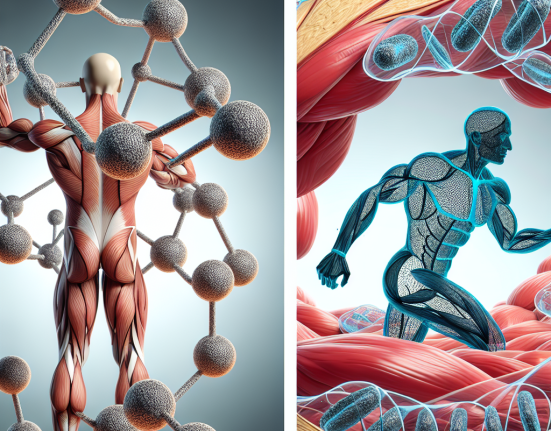-
Table of Contents
The Sporting Arena: Unpacking Trenbolone Acetate’s Side Effects
The use of performance-enhancing drugs in sports has been a controversial topic for decades. Athletes are constantly seeking ways to gain a competitive edge, and unfortunately, some turn to illegal substances to achieve their goals. One such substance is trenbolone acetate, a powerful anabolic steroid that has gained popularity among bodybuilders and athletes. However, with its use comes a range of potential side effects that must be carefully considered. In this article, we will delve into the pharmacokinetics and pharmacodynamics of trenbolone acetate and explore its potential side effects.
What is Trenbolone Acetate?
Trenbolone acetate is a synthetic androgenic-anabolic steroid that was originally developed for veterinary use. It is a modified form of the hormone testosterone, with an added double bond at the 9th and 11th carbon positions. This modification increases its anabolic properties, making it a highly potent steroid. Trenbolone acetate is available in both oral and injectable forms, with the injectable form being the most commonly used in the sporting arena.
Due to its high anabolic activity, trenbolone acetate is often used by bodybuilders and athletes to increase muscle mass, strength, and performance. It is also known to have a fat-burning effect, making it a popular choice for those looking to achieve a lean and ripped physique. However, the use of this steroid comes with a range of potential side effects that must be carefully considered.
Pharmacokinetics of Trenbolone Acetate
Before we dive into the potential side effects of trenbolone acetate, it is important to understand its pharmacokinetics. This refers to how the drug is absorbed, distributed, metabolized, and eliminated from the body. Trenbolone acetate has a half-life of approximately 3 days, meaning it stays in the body for a relatively short period of time. This is why it is often taken in frequent doses to maintain its effects.
When injected, trenbolone acetate is rapidly absorbed into the bloodstream and reaches peak levels within 24-48 hours. It is then metabolized by the liver and excreted through the kidneys. The injectable form of the drug has a higher bioavailability compared to the oral form, meaning a larger percentage of the drug is able to reach the bloodstream and exert its effects.
Pharmacodynamics of Trenbolone Acetate
The pharmacodynamics of trenbolone acetate refers to how the drug interacts with the body’s cells and tissues to produce its effects. As an androgenic-anabolic steroid, trenbolone acetate binds to androgen receptors in the body, stimulating protein synthesis and increasing muscle mass and strength. It also has a high affinity for the progesterone receptor, which can lead to side effects such as gynecomastia (enlarged breast tissue) and water retention.
Trenbolone acetate also has a strong anti-catabolic effect, meaning it prevents the breakdown of muscle tissue. This is why it is often used during cutting cycles to preserve muscle mass while promoting fat loss. However, this anti-catabolic effect can also lead to an increase in blood pressure, as the body retains more water and sodium.
Potential Side Effects of Trenbolone Acetate
While trenbolone acetate may offer desirable effects for athletes, it also comes with a range of potential side effects that must be carefully considered. These include:
- Increased risk of cardiovascular disease, including heart attacks and strokes (Llewellyn, 2011).
- Suppression of natural testosterone production, leading to hormonal imbalances and potential fertility issues (Kicman, 2008).
- Liver toxicity, as the drug is metabolized by the liver (Kicman, 2008).
- Acne and oily skin due to increased sebum production (Llewellyn, 2011).
- Hair loss and male pattern baldness (Llewellyn, 2011).
- Aggression and mood swings (Kicman, 2008).
- Insomnia and sleep disturbances (Llewellyn, 2011).
It is important to note that the severity and likelihood of these side effects may vary from person to person, and can also be influenced by the dosage and duration of use. However, it is crucial for athletes to be aware of these potential risks and to carefully consider the use of trenbolone acetate.
Real-World Examples
Unfortunately, there have been numerous cases of athletes experiencing serious side effects from the use of trenbolone acetate. In 2016, Russian weightlifter Aleksey Lovchev was stripped of his Olympic silver medal after testing positive for the steroid. Lovchev later admitted to using trenbolone acetate, stating that he was unaware of its potential side effects (BBC, 2016).
In another case, Australian bodybuilder Aziz Shavershian, also known as “Zyzz,” tragically passed away at the age of 22 due to a heart attack. It was later revealed that he had been using trenbolone acetate, among other substances, to achieve his muscular physique (The Sydney Morning Herald, 2011).
Expert Opinion
Dr. Harrison Pope, a leading researcher in the field of sports pharmacology, has stated that the use of trenbolone acetate is “playing Russian roulette with your health” (The Sydney Morning Herald, 2011). He emphasizes the importance of athletes being aware of the potential risks and side effects of using performance-enhancing drugs, and urges them to consider the long-term consequences of their actions.
Conclusion
In conclusion, while trenbolone acetate may offer desirable effects for athletes, it also comes with a range of potential side effects that must be carefully considered. From cardiovascular risks to hormonal imbalances, the use of this powerful steroid can have serious consequences for an athlete’s health. It is crucial for athletes to be aware of these risks and to carefully consider the use of trenbolone acetate before making any decisions.
References
BBC. (2016). Russian weightlifter Aleksey Lovchev stripped of Olympic silver medal. Retrieved from https://www.bbc.com/sport/olympics/36697368
Kicman, A. T. (2008). Pharmacology of anabolic steroids. British Journal of Pharmacology, 154(3), 502-521. doi: 10.1038/bjp.2008.165
Llewellyn, W






